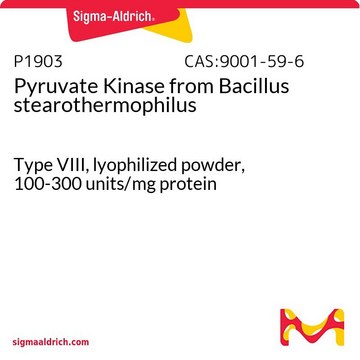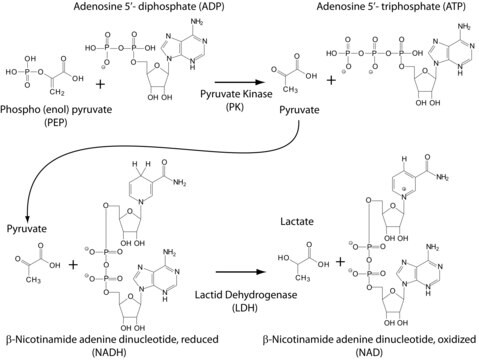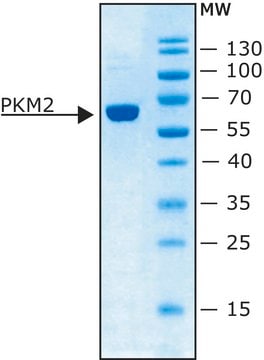SRP0189
Pyruvate kinase M2 Active from mouse
recombinant, expressed in E. coli, ≥90% (SDS-PAGE)
Synonim(y):
M2-PK tumor, OPA-interacting protein 3 (OIP-3), Pyruvate kinase 3 (PK3), Pyruvate kinase, muscle, Thyroid hormone-binding protein 1 (THBP1)
About This Item
Polecane produkty
pochodzenie biologiczne
mouse
rekombinowane
expressed in E. coli
Próba
≥90% (SDS-PAGE)
Postać
aqueous solution
masa cząsteczkowa
58 kDa
opakowanie
pkg of 20 μg
warunki przechowywania
avoid repeated freeze/thaw cycles
stężenie
>0.02 mg/mL
numer dostępu NCBI
numer dostępu UniProt
Warunki transportu
dry ice
temp. przechowywania
−70°C
informacje o genach
mouse ... PKM2(18746)
Opis ogólny
Murine Pyruvate kinase M2 (PKM2) (GenBank Accession No. NM_011099), amino acids 2-end, with N-terminal His tag, MW = 58kDa, expressed in an Escherichia coli expression system.
Zastosowanie
Działania biochem./fizjol.
Definicja jednostki
Postać fizyczna
Uwaga dotycząca przygotowania
Certyfikaty analizy (CoA)
Poszukaj Certyfikaty analizy (CoA), wpisując numer partii/serii produktów. Numery serii i partii można znaleźć na etykiecie produktu po słowach „seria” lub „partia”.
Masz już ten produkt?
Dokumenty związane z niedawno zakupionymi produktami zostały zamieszczone w Bibliotece dokumentów.
Produkty
We presents an article about the Warburg effect, and how it is the enhanced conversion of glucose to lactate observed in tumor cells, even in the presence of normal levels of oxygen. Otto Heinrich Warburg demonstrated in 1924 that cancer cells show an increased dependence on glycolysis to meet their energy needs, regardless of whether they were well-oxygenated or not.
Nasz zespół naukowców ma doświadczenie we wszystkich obszarach badań, w tym w naukach przyrodniczych, materiałoznawstwie, syntezie chemicznej, chromatografii, analityce i wielu innych dziedzinach.
Skontaktuj się z zespołem ds. pomocy technicznej






